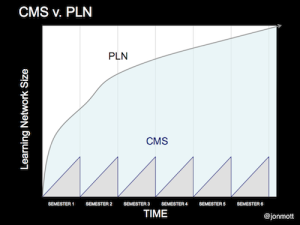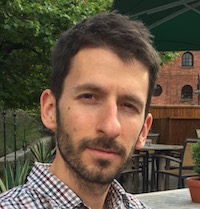A few months ago, I joined Twitter. 4 days ago, I understood what Twitter does.
I had never been much of a fan of social networks when it comes to keeping in touch with friends / acquaintances / contemporaries: I’m not on Facebook, for example.
Recently, Twitter came to my attention and I gave it a go. At first, I felt that it was a nice way to keep in touch with things, events, news and, as I’ve discovered later, people with similar professional interests.
I started off following a few news broadcasters, comedians, institutions and work colleagues. Then I looked up notorious researchers in some of my areas of interest (@henryjenkins, @markwarschauer only to name a couple) and this turned out to be an amazing way to find out about new publications, people and ideas relating to those disciplines. The horizon was expanding.
At this stage I had tweeted very little and was somewhat struggling to position myself vis-à-vis that invisible audience.
Last week I attended the Education in a Changing Environment Conference, Creativity and Engagement in Higher Education in Salford, and I met a hundred-odd technologists, all with seemingly extensive experience of using Twitter. Here’s what I learnt:
What hash tags (#) really do
 Before last week, I had never tweeted using hash tags. Only at the ECE conference I realised the purpose of tagging tweets during an event like this one. In the main conference theatre, a ‘tweet wall’ was displaying in real time the delegates thoughts and comments, and many used the conference hash tag to post links, slides and other resources for the benefit of the other participants. This brought incredible strength to the conference’s backchannel and I found it a new and very exciting way to interact with other delegates. Almost every person I spoke to during those three days, I spoke to on Twitter before meeting face to face. This created a remarkable dynamism among conference delegates, whilst allowing people who couldn’t make it to follow the event online.
Before last week, I had never tweeted using hash tags. Only at the ECE conference I realised the purpose of tagging tweets during an event like this one. In the main conference theatre, a ‘tweet wall’ was displaying in real time the delegates thoughts and comments, and many used the conference hash tag to post links, slides and other resources for the benefit of the other participants. This brought incredible strength to the conference’s backchannel and I found it a new and very exciting way to interact with other delegates. Almost every person I spoke to during those three days, I spoke to on Twitter before meeting face to face. This created a remarkable dynamism among conference delegates, whilst allowing people who couldn’t make it to follow the event online.
What’s more, today I am following via Twitter the Personal Learning Environment (PLE) Conference which takes place in Southampton (#ple_sou). The Twitter feed is an excellent addition to the live video feed, allowing to interact with other participants (on site or not) and to ask questions.
What’s really striking about this is not the technical side of it. Online Asynchronous Discussions (OADs) have been around for many years now and what Twitter achieves is in itself no feat. What is astounding is the scale and the speed of it.
Crowdsourcing with Twitter
At ECE11, Dr Alec Couros gave a wonderful example of crowdsourcing. 30 minutes before his appearance on the panel, the conference organisers provided him with a list of questions submitted by delegates. Within those 30 minutes, Alec created a public document (using Google Docs) including some of the questions he was given and he asked his 13,021 Twitter followers to contribute ideas by collaboratively editing the document. I was able to participate myself, and by the time the panel started, there was more food for thought in that document that could have been discussed during the whole conference. Alec also explained that he had used a similar process to get feedback on his CV when he (successfully) applied for tenure.
Now when I’m at work, I’ll regularly have 2 or 3 Twitter feeds open on my desktop to keep an eye on what’s happening!





